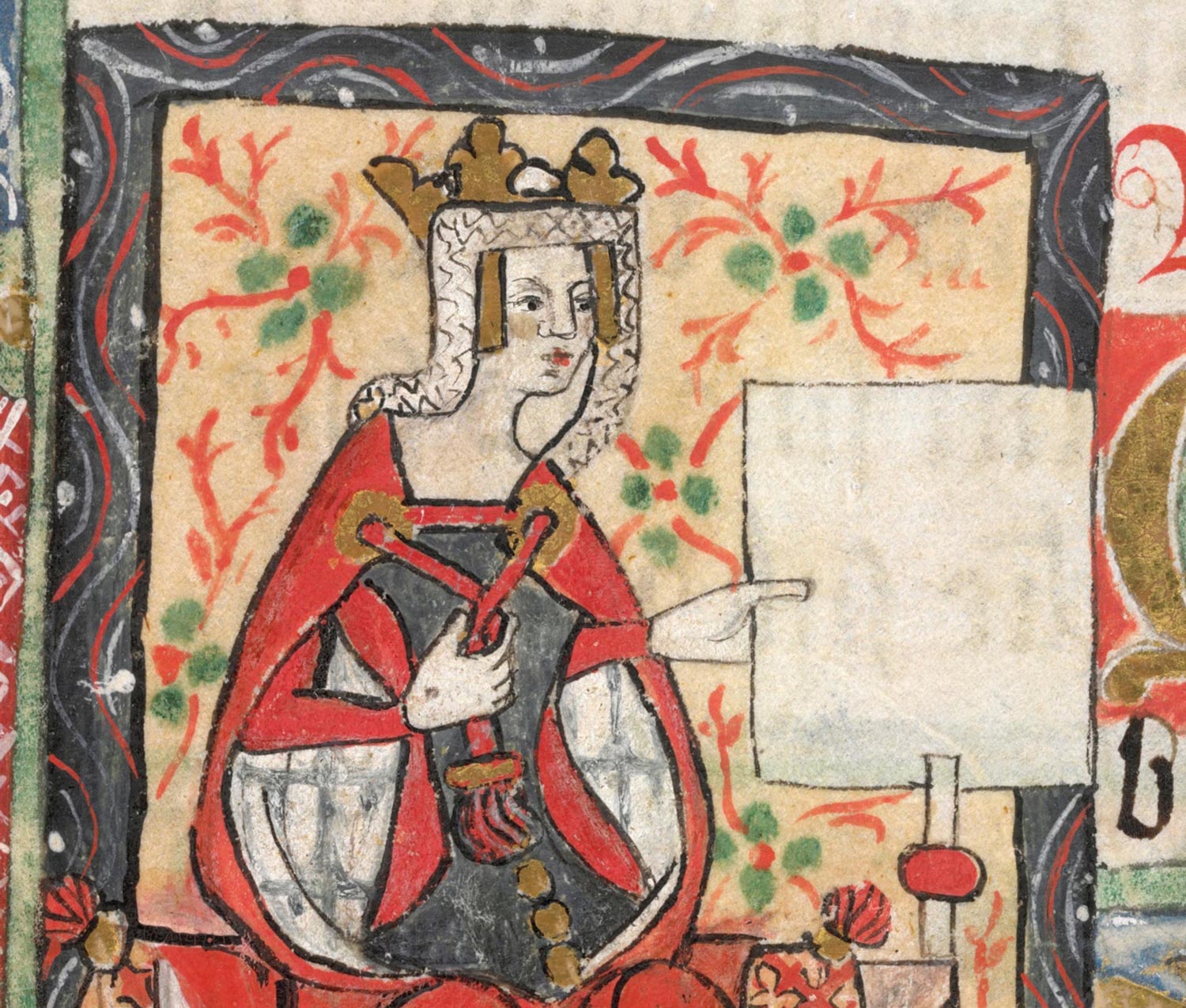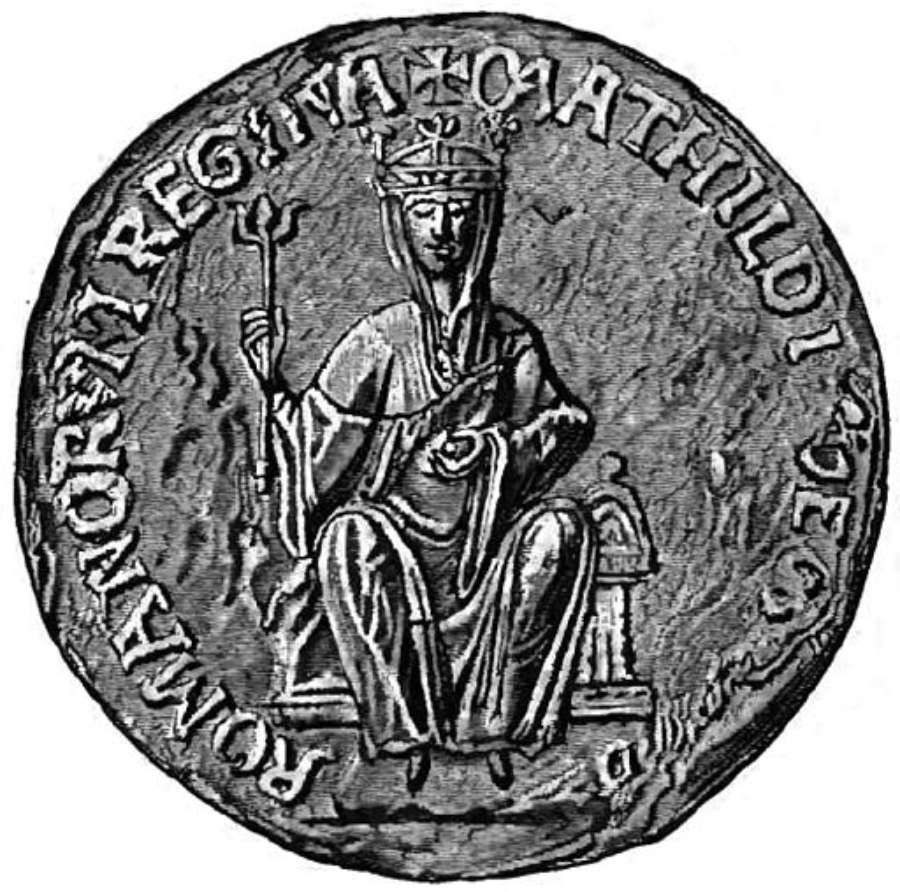Matilda
The anarchy of the Empress Matilda
Born February 1102, Sutton Courtenay, England Died 10 September 1167, Normandy
Daughter of a king, married to a count, mother of a king, but never quite a queen. Always the Empress.

Matilda was the daughter of Henry I and his queen Edith (also known as Matilda), the daughter of the king of the Scots and decended from Anglo-Saxon royalty. She had been married to the Holy Roman Emperor with the dowry of a fortune and, after his death, to Geoffrey count of Anjou. In 1133 she became mother to Henry Plantagenet, heir to Henry I as King of England and Duke of Normandy.
Very little of this did her any good at all.
Matilda's marriages did little for her. Whether or not she was already haughty and high handed, this was how she returned from the Empire with her regalia and title of Empress which she continued to use. It seems that she had a clear idea of her station in life and the expectation that others should too. We can surmise that this made her hard to do business with, let alone like.
Her second marriage was a strategic move to match her personality. Desperate for an heir after the death of his son in the White Ship disaster of 1120 and aware of the need to safeguard his lands from invasion after his death, Henry arranged Matilda's marriage to Geoffrey count of Anjou. Anjou was Normandy's neighbour and age-old enemy. Henry's son William had been married to a daughter of the then-count, but the prospect of an Angevin count as de facto heir to Norman lands was deeply unpopular.
That is why Henry I lined up his barons to swear fealty to the infant Henry as his heir under the protection of Matilda. Geoffrey was out of the question. As was Matilda's succession in her own right. While many women had effectively ruled as regents, minding the store while their husbands were away on campaign or crusade, only one had ruled in their own name in recent history. The prospect of a queen, a queen that was Matilda, and a queen married to the count of Anjou, would have been too much to expect the Anglo-Norman barons to swallow in one go. Regent, however, in the footsteps of William the Conqueror's Queen Matilda and Henry's own Queen Edith: that was acceptable.
Or it was, until the moment Stephen of Blois raced to seize the crown on the old king's death in 1135 with near unanimous English support.
All Matilda had was the young Henry and, as it would turn out, inadvertent help from Stephen himself.
Henry Plantagenet gave Matilda the credibility to challenge Stephen for the throne. Henry secured the family question for the cause. Earl Robert of Gloucester, illegitimate son of Henry I, came over at the earliest opportunity. The opposition was properly up and running.
The quick onset of doubts about Stephen pushed more to Matilda and Henry's cause. They were joined by those who found their hopes of preferment dashed by Stephen's kingship. Bishop Roger of Salisbury and his nephews abandoned the royal administration following their arrest and release by the king. None other the Stephen's younger brother, Henry bishop of Winchester, also turned to Matilda in December 1138 after Stephen overlooked him for the vacant see of Archbishop of Canterbury. Henry of Blois went on to add a papal legateship to his wealthy and influential see, although his support shifted again when Matilda failed to confirm another family member, Eustace, to the honour of Boulogne.
It was enough to create an uneasy balance. Matilda and Robert controlled the West Country. After 1144, after years of neglect by Stephen, Geoffrey added Normandy, causing families to have to choose between their ancestral lands over the Channel and their often richer possessions in Stephen's England. But it was not enough.
Matilda's lucky break came in 1141 when Stephen gave battle against her larger force at Lincoln. Her victory was convincing and the king was her prisoner. England could then look forward to what the Empress Matilda could bring. Unfortunately she showed them.

Her arrival in London looked arrogant even by her standards. A Stephen heartland, she demanded a tallage from Londoners that was exhorbitant to pay for a coronation and promptly caused a riot which threw her out even before anybody could be crowned.
Matilda could be brave. When captured herself and held in Oxford she escaped into the night camouflaged against the snow in a white cloak to make her way to Wallingford. But she could not find the loyalty to tip the balance against a king, even one as flawed as Stephen. The conflict settled into a war of attrition between castles as the decade wore on.
Once again, it was the young Henry who was her biggest asset. As leading names on both sides tired and died, Henry strode onto the scene.
Admittedly his first effort was nearly his last. Henry's 1148 campaign relied on mercenaries but ran out of money. He was bailed out by Stephen himself on condition that he returned home. It was not auspicious. It was a mistake Henry would not make again.
Momentum was with him. He came of age in 1150, gained Anjou on his father's death in 1151 and in 1152 married Eleanor, heiress to Acquitaine and formerly wife of the king of France. Eleanor did not just bring lands and wealth, she brought a formidable presence that would lead her to become one of the most important women - one of the most important people - of the age.
Henry - personally impressive himself - now had momentum. In 1153 he arrived back in England for a reckoning. Stephen, now without his queen and eldest son, Eustace, was prepared to face him.
The English barons were not. They wanted an end to things. However hard they felt Henry I had borne down on them, they wanted a king. Henry and Stephen were left to resolve things around a table. The Treaty of Winchester proclaimed
Know that I, King Stephen, have established Henry, duke of Normandy, as my successor in the kingdom of England, and have recognised him as my heir by hereditary right; and thus I have given and confirmed to him and his heirs the kingdom of England.
Treaty of Winchester (1153)
Rule was effectively joint as, in the last gasp of stalemate, Stephen reigned on to his death the following year. Stephen's surviving son appears uninterested in the crown for himself. It was rare, but perhaps unsurprising.
When the king died the earl [Henry] was beyond the sea, and no man dared do other than good because of great awe of him. Then when he came to England, he was received in great honour and was blessed as the king in London on the Sunday before midwinter's day...
Anglo-Saxon Chronicle (1154)
As the Anglo-Saxon Chronicle stuttered through its final page it arrived back at the season which brought the last days of Edward the Confessor eighty-eight years earlier. This time there was no uncertainty. Henry II was king. King he would be, ruling from the Scots' border to the Pyrenees. If the England of 1154 was recognisable to the England of William the Conqueror's day, by the end of Henry II's reign in many ways it was a whole new world.
